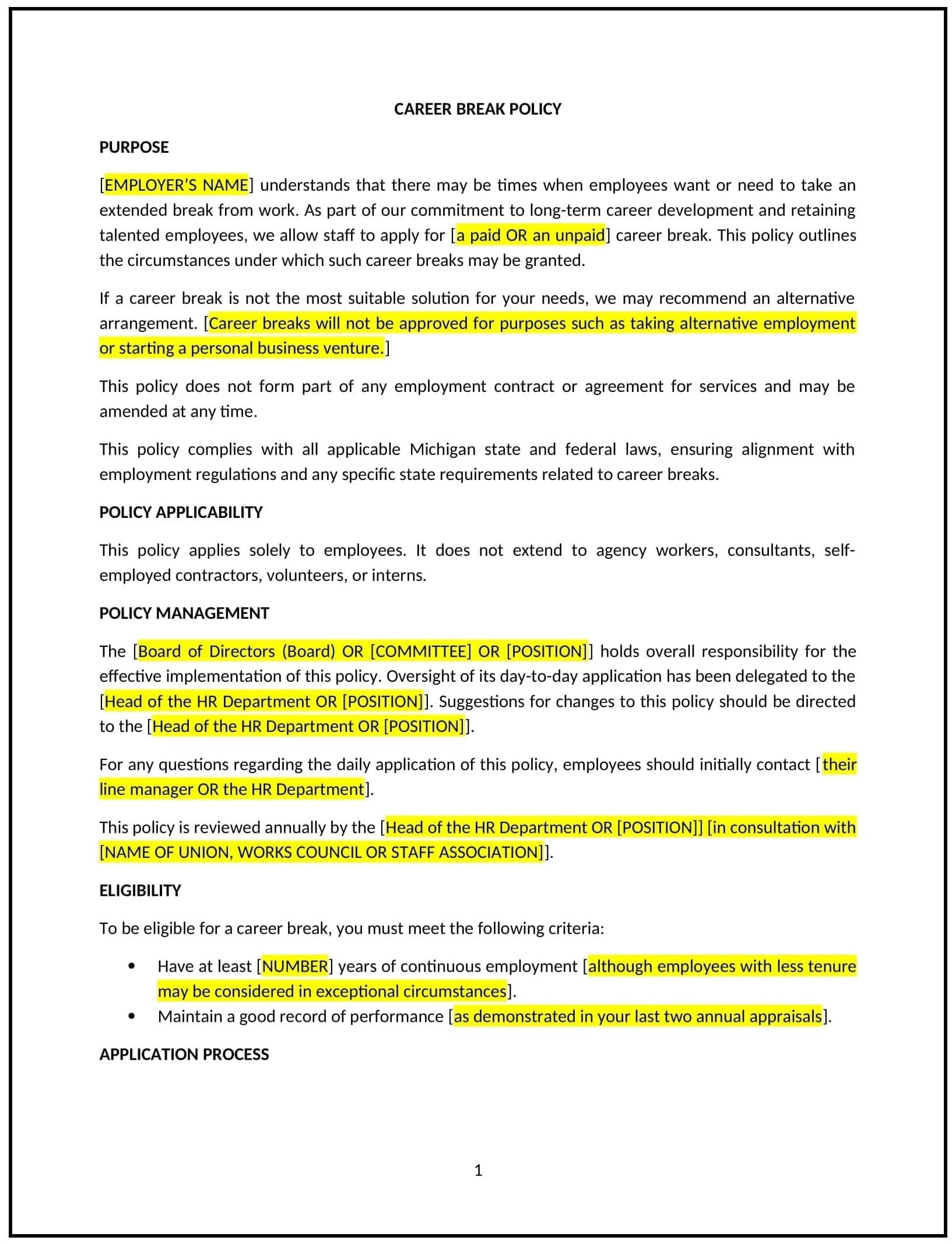Got contracts to review? While you're here for policies, let Cobrief make contract review effortless—start your free review now.

Customize this template for free
Career break policy (Michigan)
A career break policy provides Michigan businesses with guidelines for offering employees the option to take an extended leave of absence for personal reasons, such as travel, education, or family matters. This policy allows employees to step away from work temporarily while maintaining job security, providing flexibility for both the employee and the business.
By adopting this policy, businesses can support employee well-being, promote retention, and offer a valuable benefit that helps employees balance work and personal life.
How to use this career break policy (Michigan)
- Define eligibility: Clearly outline who is eligible for a career break, such as full-time employees who have worked at the company for a specific period (e.g., 1-2 years).
- Set the duration of the break: Specify the duration of career breaks, such as 3 to 12 months, and whether the break can be extended or shortened based on business needs or employee requests.
- Address the purpose of the break: Provide examples of acceptable reasons for taking a career break, such as personal development, pursuing education, caring for a family member, or long-term travel.
- Outline the process for requesting a break: Set clear procedures for how employees should request a career break, including notice periods, required documentation, and the approval process.
- Clarify the impact on benefits: Specify how benefits such as health insurance, retirement contributions, and paid time off will be affected during a career break.
- Define job security: Assure employees that their position or a similar role will be available to them when they return from the career break, as long as they comply with the policy requirements.
- Set expectations for communication: Outline how often employees on career break should check in with the company (e.g., once every 3 months) and how they can stay informed about any important changes at the organization.
Benefits of using this career break policy (Michigan)
This policy provides several key benefits for Michigan businesses:
- Enhances employee retention: Offering career breaks can increase employee loyalty and help retain valuable talent, especially when employees can take time off without the risk of losing their job.
- Supports work-life balance: Allows employees to take a break for personal reasons without sacrificing their professional career, promoting a healthier work-life balance.
- Increases employee satisfaction: Offering flexibility for personal growth or family commitments can lead to greater employee satisfaction and morale.
- Reduces burnout: Career breaks allow employees to recharge and return to work with renewed energy, potentially reducing burnout and improving productivity.
- Demonstrates a commitment to employee well-being: Shows that the business values employees’ personal lives and is willing to support them in balancing both professional and personal goals.
Tips for using this career break policy (Michigan)
- Communicate the policy: Make sure employees are aware of the career break policy by including it in the employee handbook and discussing it during onboarding.
- Plan for coverage: Ensure that adequate coverage is in place for the employee’s role during their absence, and communicate with the team to minimize disruption.
- Be flexible with requests: Consider the employee's situation when evaluating requests for career breaks, offering flexibility in terms of duration or timing if possible.
- Track career break usage: Maintain records of career breaks taken by employees and ensure consistency in approval and application of the policy.
- Review periodically: Update the policy regularly to reflect changes in Michigan laws, company needs, or industry practices.